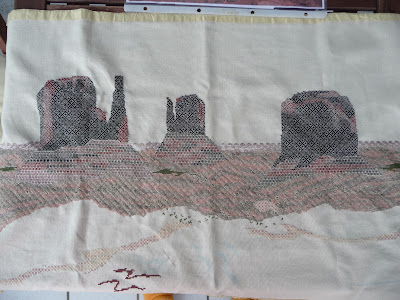It's coming along really nice I think. The trick will be the combining of the far and near grounds. I've been working on this for a little over 3 months now. It's moving along much faster than I expected.
Saturday, September 28, 2013
Wednesday, September 11, 2013
Excitement on the Construction Site
It's been quite an exciting couple of days at the construction site. And the following weeks and months look like the excitement is going to continue.
 |
| Building the crane started around 1pm |
 |
| Adding the cement blocks |
 |
| Cement blocks all stacked up |
 |
| While the crane was being built, the backhoe was still busy loading up trucks full of dirt |
Labels:
everyday life
Sunday, September 8, 2013
Friday, September 6, 2013
Snakes in the Park
The title might be misleading. I sure thought it was a snake. Wouldn't you think it was a snake? It was just hanging out on the road. Because I know that snakes like to do that, I always try to not run over anything straight and long. This time, I didn't run over it and, when I looked back, it hadn't slithered away. So I turned around to check it out. I was pretty happy with my luck in getting such nice pictures and immediately looked up what kind of snake it was when I got back home because it didn't look like the kind I usually see. And guess what.....It isn't a snake at all!!! And this is where I give you a biology lesson. It would be biology, wouldn't it? You can skip the lesson if you want but you'll miss something very cool!!!!
Anguis fragilis, or slow worm, slow-worm or slowworm, is a limbless reptile native toEurasia .
It is also sometimes referred to as the blindworm
or blind worm.
Slow worms are semifossorial (burrowing) lizards, spending much of the time hiding underneath objects. The skin of the varieties of slow worms is smooth with scales that do not overlap one another. Like many other lizards, slow worms autotomize, meaning they have the ability to shed their tails to escape predators. The tail regrows, but remains smaller.
These reptiles are mostly active during the twilight and occasionally bask in the sun, but are more often found hiding beneath rocks and logs. They are carnivorous and, because they feed on slugs and worms.
Although these lizards are often mistaken for snakes, they aren't. The most important difference is that they have small eyes with eyelids that blink like lizards'; this feature is not found in snakes. They may also have visible ears as do lizards, which snakes do not have. They shed their skin in patches like other lizards, rather than the whole skin as most snakes do. Slow worms also shed tails by breaking one of their tail vertebra in half, as lizards do.
Adult slow worms grow to be about 50 cm long, and are known for their exceptionally long lives; the slow worm may be the longest-living lizard, living about 30 years in the wild and up to 54 years in captivity.
So..... just to refresh your memories, here are a couple pictures of the other kind of snake I see. After completing my research (yes, I do research for things like this) I came to the conclusion that the 'big' snake I had the chance to observe a couple years ago, was actually the same kind as the little snakes.
So, there you have it....a snake lesson from Germany. Don't expect a spider lesson any time soon though!
Anguis fragilis, or slow worm, slow-worm or slowworm, is a limbless reptile native to
Slow worms are semifossorial (burrowing) lizards, spending much of the time hiding underneath objects. The skin of the varieties of slow worms is smooth with scales that do not overlap one another. Like many other lizards, slow worms autotomize, meaning they have the ability to shed their tails to escape predators. The tail regrows, but remains smaller.
These reptiles are mostly active during the twilight and occasionally bask in the sun, but are more often found hiding beneath rocks and logs. They are carnivorous and, because they feed on slugs and worms.
Although these lizards are often mistaken for snakes, they aren't. The most important difference is that they have small eyes with eyelids that blink like lizards'; this feature is not found in snakes. They may also have visible ears as do lizards, which snakes do not have. They shed their skin in patches like other lizards, rather than the whole skin as most snakes do. Slow worms also shed tails by breaking one of their tail vertebra in half, as lizards do.
Adult slow worms grow to be about 50 cm long, and are known for their exceptionally long lives; the slow worm may be the longest-living lizard, living about 30 years in the wild and up to 54 years in captivity.
So..... just to refresh your memories, here are a couple pictures of the other kind of snake I see. After completing my research (yes, I do research for things like this) I came to the conclusion that the 'big' snake I had the chance to observe a couple years ago, was actually the same kind as the little snakes.
 |
| Little Ringelnatter, in English - green grass snake |
 |
| I guess they are curious |
 |
| This is the 'big' snake but it's probably just an older version of the little one in the water. |
So, there you have it....a snake lesson from Germany. Don't expect a spider lesson any time soon though!
Subscribe to:
Comments (Atom)

















